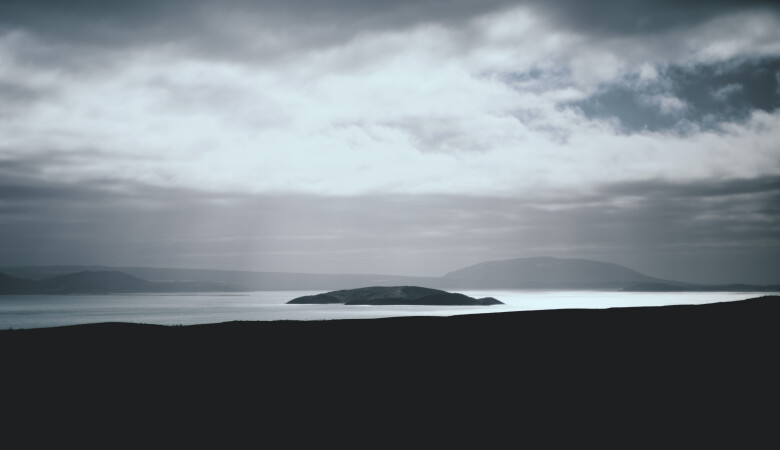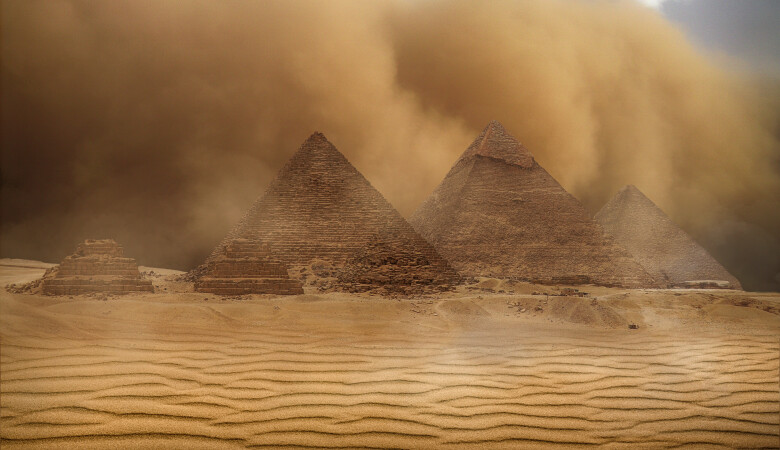The Eternal King Arises and Establishes His Beautiful Kingdom (Isaiah Sermon 35 of 80)
December 30, 2012 | Andy Davis
Isaiah 33:1-24
Heaven, Grace, Hell
Pastor Andy Davis preaches a verse-by-verse expository sermon on Isaiah 33. The main subject of the sermon is how God acts to establish his glorious kingdom.
- Sermon Transcript -
Turn in your Bibles to Isaiah chapter 33. I begin this incredible chapter, I was saying to somebody this morning, it's like a magnificent piece of sheet music, and I get to sit down at the Steinway and play it, and I don't think, don't know that my skill is going to be up to it. If I were literally playing piano, my skill would absolutely not be up to it. I can do some things with my right hand. That's it. But this is a magnificent text of Scripture, and as I meditate on the truths there are in Isaiah 33, I think about another passage of Scripture, 1 Corinthians 13:12, which says, "Now we see but a poor reflection as in a mirror, then we shall see face to face." Thinking about that verse this morning, what is the nature of the poverty of the reflection? Why is it a poor reflection? Why do we see in a glass dimly, it says in the KJV. It's because, all we are given are words. That's it. You have the gifts of the Spirit, you have words, and that's all you're gonna get from me this morning; you will not get the vision. Some day there will be the vision; you will see the King in his glory. This morning, all you get are words, and those words will be effective in your life only by faith, only if God gives you faith will these words do anything for you at all.
There are three magnificent, overpowering themes in Isaiah 33. The first is the terrors of hell. Look at verse 14, "The sinners in Zion are terrified; trembling seizes [or surprises] the godless: ‘Who of us can dwell with the consuming fire? Who of us can dwell with everlasting burning?’" And so in these words, I see the terrors of hell. Secondly, the delights of heaven. Look at verse 17, "Your eyes will see the king in his beauty and view a land that stretches afar." And thirdly, overall, though no specific verse talks about it, the marvelous, the wondrous grace of God in accepting such pathetic repentance from sinners like us, and blessing it with full forgiveness of sins and the lavish graces of heaven. So what do I mean by that? Well, the circumstances in this chapter are that God has pressed the people of Judah and Jerusalem to the point where they have nowhere to turn, but God. God has become their last resort, and it is a dishonor to God to be our last resort. He should be our first resort. We should think first about Him and flee to him whenever there's any trouble, and bring all of the issues of our lives to him immediately, but the people of Judah and Jerusalem were stubborn and they tried everything they could to avoid the pressure of the Assyrian invasion, they looked to Egypt, they looked to gold and silver, they tried to buy off the Assyrians. And when there was nothing else left to do, finally they trusted the Lord, and God accepted it and delivered them. And that's incredible, when you think about, it's just incredible.
I was thinking about the testimony of C. S. Lewis. He calls himself the most reluctant convert in the history of Christendom. He was in one sense dragged kicking and screaming into the Kingdom of Heaven. These are his words, his own testimony, he said, "You must picture me alone in that room in Magdalen, night after night, feeling, whenever my mind lifted even for a second from my work, the steady, unrelenting approach of him whom I so earnestly desired not to meet. That which I greatly feared had come upon me at last. In the Trinity Term of 1929, I finally gave in, and I admitted that God was God, and [I] knelt and prayed [to him]. Perhaps, that night, the most dejected and reluctant convert in all England. I did not then see what was the most shining and obvious thing: the divine humility, which will accept a convert even on such [pathetic] terms. The prodigal son at least walked home on his own feet. But who can but duly adore that love, which will open the high gates to a prodigal which is brought in kicking, struggling, resentful, darting his eyes left and right in every direction for a chance somehow to escape?" Ray Ortlund commenting on this said that “C. S. Lewis is speaking for us all. We come to God reluctantly. We return to God reluctantly…. Isaiah 33 [then comes] out of a setting in which God's people were reluctantly turning back to Him” when they had nowhere else to turn. “Repentance was not their way of life,” they had not up to that point seen God as the fountain of all blessings, but only as a last resort. Repentance “was a last ditch effort to stave off [the impending] disaster. But God received them anyway!”
That may be your circumstance today. It may be that God and life, providence, things that are going on in your life may be so pressing you that you think there's nowhere else to turn, but Jesus, then turn to Jesus! Isn't it amazing how he'll receive you, even on those terms? Turn to Jesus. I'm praying that the eyes of your heart will be enlightened, and you'll flee the wrath to come, and flee toward the pleasures to come, and turn to Jesus.
And so we see in Isaiah 33, the circumstance. So what I'm gonna do in this sermon, is I'm gonna bring you quickly through all 24 verses, if that can be done. I'm gonna bring you through the whole chapter and just give you an understanding of these words in their setting: what was going on in Isaiah's day, what was going on with Assyria. But we're not gonna stay there long, we're going to float above the immediate circumstances, 'cause the words here point to the end, they point to eternity, the words point to hell and heaven, and to the grace of God.
I. Woe to the Destroyer (vs. 1-6)
So let's start in verses 1-6 with this “Woe, woe to the destroyer.” Look at verse 1, "Woe to you, O destroyer, you who have not been destroyed! Woe to you, O traitor, you who have not been betrayed! When you stop destroying, you will be destroyed; when you stop betraying, you will be betrayed." So here we have this prophetic woe. From Isaiah 28-31, there are five woes, one after the other. The first five, all of them, were given to Judah and Jerusalem, to the people of God, to Israel, to the Jews. Woe to you for your hearts being far from God, or to turning to Egypt for help and sending emissaries down to Egypt. One woe after the other given to the Jews. This one is different. This one is given to Assyria. It's a woe from God to Assyria, the destroyer who is coming. And why this woe? Because of their wickedness and their treachery, because of how they're treating their neighbors. They're giving a cup of destruction to their neighbors, and like it says in Habakkuk 2, "Now it is your turn, drink and be exposed. The cup from the Lord's right hand, the one that you are handing to your neighbors is gonna come back to you." Proverbs 26:27 says, "If a man digs a pit, he will fall into it; if a man rolls a stone, it will roll back on him." Whereas Jesus said in Matthew 7, "The measure you use is the measure you will receive." Or like we say in everyday speech, "What goes around comes around." How you're treating your neighbors is finally gonna come back to you.
Now, Assyria was the destroyer, the vicious force of evil in the world at that time, utterly malicious, no mercy at all, cruel. And that's the way they treated their neighbors. But what of this treachery? This betrayal? What is this speaking of here? How were they betrayed? Well, they invaded the promised land, they began the invasion and they threatened Jerusalem. King Hezekiah responded by sending them 300 talents of silver and 30 talents of gold. Now, the 300 talents of silver were all the silver they had in the treasury. They emptied the treasury to send it to Sennacherib, king of Assyria. The 30 talents of gold they didn't have until they finally stripped it off of the temple itself and sent that to Sennacherib as well. The idea was to buy him off so he'll take the silver and gold and go back to Assyria. But once Sennacherib received that silver and gold, he told the emissaries that had brought it, "By the way, Jerusalem must completely surrender, or else I'll crush it."
So what was the point of the silver and gold? There was an understanding that, "If we send this tribute to you, you'll leave us alone and let us continue." And so you can see in verses 7-8, the emissaries come back, the treaties, the messengers come back, they're weeping, they're wailing, the streets are deserted, the warriors are terrified, and the treaty has been broken. That's what's going on here. Those are the circumstances. And so God then speaks through the prophet Isaiah, a woe on Assyria for what they're doing. Up to this point, as I said, the woes have all been directed toward the people of God, they've all been directed toward Judah and Jerusalem and Israel. But God is saying now to Assyria, and He doesn't say, “Assyria, by the way.” This is one of those situations where I think he just lays out the shoe, and if the shoe fits, wear it. It's gonna be the same for Babylon, it's gonna be the same for every nation that treats their neighbors like this. What goes around is going to come around. And God is sovereign, and when their time, their time of destroying has come to an end, then they're going to get destroyed.
"What goes around is going to come around. And God is sovereign, and when their time, their time of destroying has come to an end, then they're going to get destroyed."
"There's a time for every purpose under heaven," it says in Ecclesiastes, "and God measures all things out," and so when Assyria's time at the center stage of human history is over, they're gonna get crushed and destroyed, up to this point, they've not been destroyed, but it's going to come on them. "And you O Sennacherib, you are going to be betrayed. You're going to be betrayed.” Now, the only way you can be betrayed is by someone that you have a relationship with, someone you have a connection with, and so God in his sovereignty saw to it that his own sons would assassinate him while he was worshipping in the temple of his god, Nisroch, back in his home country. Does God's arm reach that far? Yes, it does. It reaches farther than that, and God can move in the hearts of Sennacherib's own sons to kill him and betray him, and then flee and then another son took his place. And so this prophetic woe comes on Sennacherib and the Assyrian Empire as a whole.
Now, in verse 2, we have Judah's response. Like I said, God has been pressing them. When times are good, we don't change, friends, it's just that simple. It's when things are miserable, when things are wretched, that suddenly from us come those prayers of repentance, from us come those pleas to God, and those yearnings that should have come more naturally. But look at verse 2, "O Lord, be gracious to us; we long for you. Be our strength every morning, [and] our salvation in times of distress." This at last is the faith that Judah should have been showing all along. Shamefully up to this point, Judah has turned to everything, but God. They trusted in their silver and gold, sent it down to Egypt on the backs of camels and donkeys, trying to win their military power as an alliance to deliver them from Assyria. They trusted in that. They sent off that silver and gold to Egypt with high hopes, but that didn't work. And now in this case, as Sennacherib is on the doorstep of destroying Jerusalem, as he's coming nearer, they send off yet more silver and gold again with high hopes, "Maybe this will turn him aside and he'll just take it and go back." But that didn't work.
Now, finally they turn to God. And God is so patient, God is so, in some sense, humble, to accept this kind of prayer in those circumstances. We could easily say something like, "Yeah, now you turn. Now, you come to me, now when things are so tough, finally you think about me. Well, I'm not gonna have it." But God doesn't do that. How gracious is He? And so look at the prayer, a cry that God would be gracious to them, "O [God], be gracious to us." A yearning that we not be treated as our sins deserve. That's what grace is all about. It's God's determination to not treat us as our sins deserve, but instead bless us with infinite blessings. "O [God, do that for us.] Be gracious to us." And then it says, "We long for you, we yearn for you, our hearts are attracted to you, we're only thinking about you right now. You are our only hope. You are our only thought. We yearn for you, we want to be close to you. And be our strength every morning, be our salvation in this time of distress." They're crying out to God.
"A yearning that we not be treated as our sins deserve. That's what grace is all about. It's God's determination to not treat us as our sins deserve, but instead bless us with infinite blessings. "
In verses 3-6, they speak words have rediscovered faith and trust in God. You think about these words in verses 3-6—if they thought these things were true, then why did they ever send emissaries down to Egypt, why did they try to buy off Sennacherib if they believed these things were true. "At the thunder of your voice, [O Lord,] the peoples flee; when you rise up, the nations scatter. Your plunder, O nations, is harvested as by young locusts; like a swarm of locusts men pounce on it." These are words of faith, of affirmation, of trust in God. "God can do anything, God can destroy the Assyrians, God can destroy any invaders that trouble us. When God rises up, the people flee."
And they acknowledge, in verses 5-6, that God alone is their true treasure. Look at those wonderful verses, "The Lord is exalted, for he dwells on high; he will fill Zion with justice and righteousness." Verse 6 is a treasure verse, "He will be the sure foundation for your times; [he will be] a rich store of salvation and wisdom and knowledge; the fear of the Lord is the key to this treasure." So they acknowledge that the fear of the Lord is the key to everything. If they had only feared the Lord like this before, they wouldn't have been in this circumstance; they wouldn't have fled into idols; they wouldn't have broken the covenant; there wouldn't have been any need for the Assyrians to come as a rod of God's discipline and wrath; there would have been no need for it. The fear of the Lord at last, they realize is the key to every good thing.
If I can just pause and say, it's my desire and prayer that the later words in this text will bring you to the fear of the Lord, the healthy fear of the Lord. There is a healthy fear of the Lord, there's a healthy fear of hell, and a yearning to please God, that is the beginning of wisdom, the Scripture says. And in verse 6, it says, that's the key to every treasure: the fear of the Lord.
II. The King Arises (vs. 7-16)
Now, in verses 7-16, we see the king arising. The king arises. Verse 7-9 is the immediate circumstance, I've already quoted, I'll just read it over quickly, "[Behold], their brave men [the warriors] cry aloud in the streets; the envoys of peace weep bitterly. Highways are deserted, no travelers are on the roads. The treaty is broken, witnesses are despised, no one is respected." So this is the immediate circumstance: The envoys have come back with the bad news, "Sennacherib is coming anyway." Verse 9 describes the effect of the Assyrian invasion on the local nations, "The land mourns and wastes away, Lebanon is ashamed and withers; Sharon is like the Arabah, [it's a desert], and Bashan and Carmel drop their leaves." It's just a time of being stripped by this wicked empire, as they come. So that's the present anguish, and that's the setting.
Now, God says in verse 10, "It is time for me, at last, to rise up." “‘Now will I arise," says the Lord. "Now will I be exalted; now will I be lifted up." Now he rises up in action, he rises up sovereignly and with great power, but the exaltation comes in the hearts, the apprehensions of created beings as they see God rise up and act. As godly people see what God does and give him the praise and glory, and they exalt him in their own estimation, when they see the wonders of God.
He speaks to the Assyrians, I think, in Verse 11, “You conceive chaff, you give birth to straw; your breath is a fire that consumes you." Speaking to the invader, saying, "Your plans are chaff, and you're gonna get burned up." Verse 12, “The peoples will be burned as if to lime.” That's the Gentiles, these Assyrians are gonna be burned as if to lime. “Like cut thorn bushes they will be set ablaze." And then a warning to the nations of the Earth, “You who are far away, hear what I have done; and you who are near, acknowledge my power!" So God desiring to be glorified in what he will do. He says, "The news is gonna go far. Everybody is gonna hear about this. And you nations, you should fear me, and you should submit to me."
But now, in verse 14, we have this terrifying word, right in the middle, "The sinners in Zion are terrified; trembling grips the [hypocrites]: ‘Who of us can dwell with the consuming fire? Who of us can dwell with everlasting burning?’" Who are these people who are crying this out? Well, they are in Zion, they're Jews, they're Jewish people. They're described as sinners, or hypocrites, they have no right relationship with God, and so it has been in every generation. There is a visible people of God, and in their midst, there are hypocrites that are only going along for the ride. They are the sinners in Zion. In their day, they would be Jews who did wicked things, who accepted bribes, and plotted murders, and committed adulteries, and ran after the idols. They were the wicked Jews who would not keep the covenant, who did not fear the Lord and thought nothing of him. And so the events surrounding Sennacherib's invasion will bring terror to them because they will not flee to God and find refuge in him, they will not find comfort in God. They're actually terrified not ultimately, of Sennacherib and the Assyrians, they're terrified of God—he is the consuming fire. And they're surprised by it. Trembling has seized them, has taken hold of them like a highway robber, like a bandit. They're surprised by this terror that suddenly come upon them; they were confident before, they weren't afraid of anything, but now suddenly terror has seized them, and they don't know how to escape, the sinners in Zion. And they'll find no refuge in God, that they will be destroyed, as we'll talk about it, Sennacherib conquered and destroyed 46 cities in Judah before coming to the walls of Jerusalem. Lots and lots of dead Jews, lots and lots of dead people. And so his wrath is not just on the destroyer who hasn't stopped destroying it; his wrath is on the sinners in Zion, as well as their end has come, and terror is gripping them. For God, it says, is a “consuming fire.”
You remember the account in Exodus 24 of God coming down on Mount Sinai, and he came down in a cloud on Mount Sinai. And in Exodus 24:17, it says, "To the Israelites the glory of the Lord looked like a consuming fire on the top of the mount." So that was the appearance of the glory of God as it settled down on Mount Sinai. As God descended it was like a consuming fire, this cloud at the top of the mountain. Later in Deuteronomy 4, he says, "Be careful not to forget the covenant of the Lord your God that he made with you; [and] do not make for yourselves an idol in the form of anything the Lord your God has forbidden. For the Lord your God is a consuming fire, a jealous God." So when the sinners in Zion are crying out, "Who of us can dwell with the consuming fire?" They're speaking of God.
To me, the best natural picture of this is the sun. The sun is a raging inferno of nuclear power, it's a continual nuclear explosion on full display before our eyes every day, despite the fact that it's 93 million miles away, you can't look at it for very long or you'll go blind. You can't get near to it, as I mentioned in the sermon on this passage in Hebrews 12, NASA has sent a probe and the closest that they can get to it is 32 million miles away. As I mentioned at the time, a probe now can get eight times closer. Well, that's incredible. Now, they are four million miles away, and at four million miles away, it's 2600 degrees Fahrenheit—on the surface of the sun, 10,000 degrees Fahrenheit. Physicists estimated the center of the sun, 27 million degrees Fahrenheit. As God dwells in unapproachable light, so the sun is unapproachable heat. It's a picture of the wrath of God in hell. And who of us can dwell with that? Trembling has gripped the hypocrites in Zion, it has gripped the godless, and they are terrified. This is a consistent picture over and over in Scripture. John the Baptist speaking of Christ, he says, "His winnowing fork is in his hand, and he will clear his threshing floor, gathering up the wheat into his barn [but] burning up the chaff with unquenchable fire." And as Jesus says in judgment, when he sits on his throne in heavenly judgment, he will say to those on his left, “Depart from me, you who are cursed, into the eternal fire prepared for the devil and his angels.”
The text asked this question, who may dwell with that? Who can dwell with a God like that? A God who is a consuming fire? Who can dwell with everlasting burnings? Well, the text answers the question, verse 15, "He who walks righteously and speaks what's right, [he] who rejects gain from extortion and keeps his hand from accepting bribes, who stops his ears against plots of murder and shut his eyes against contemplating evil—this is the man who will dwell in the heights, [this is the one] whose refuge will be the mountain fortress.” Stepping back and looking at the whole of Scripture, the answer that the text gives is the perfectly righteous person may dwell with the consuming fire. That's the answer. Those that are perfectly righteous. The problem is we are combustible sinners. We are combustible sinners, and if we get near this consuming fire, we will be burned up. God said in Exodus 33:3, he said to Moses, "I will not travel with you anymore, you will go unto the land flowing with milk and honey alone without me, because if I continue to travel with you, I might destroy you." Do you remember that? I might destroy you, but yet at his calling into this mission, you remember what site it was that diverted him from caring for his father's sheep? When he was 80 years old, what did he see? He saw a miracle, he saw a miracle. He saw a consuming fire in the midst of a bush, but the bush wasn't getting consumed. And the text says in Exodus 3, it was the Angel of the Lord there. The radiance of God's glory, it's Jesus, who in the radiant glory was in the midst of a very combustible bush, and the bush wasn't getting burned up. So, that gives us some hope, doesn't it, that God through Christ can dwell in our midst and we not get burned up. So we have some early indications of the grace of God in Christ in the gospel. I'll talk more openly and directly about it at the end of the sermon, only the perfectly righteous can survive with this consuming fire.
III. The Beauty of the King and His Kingdom (vs. 17-24)
Now in verses 17-24, we have the beauty of the King and his kingdom, verse 17, the promise of the future, "Your eyes will see the king in his beauty and view a land that stretches afar." Here, Isaiah speaks of the blessedness of the righteous, those who not only can dwell with the consuming fire and with everlasting burning, not only that, but what they will see, the magnificence of what they will see—they will see the king in his beauty, and they will view the land as it stretches afar. Now, if any of you think he's talking here about Hezekiah, he's not. This is not the beauty of Hezekiah that's gonna be in view here, and so we must fly far above the immediate circumstances here to say what King will be so beautiful as to fill our eyes with his beauty, and what land will stretch afar that we will see at that time? I believe it can be none other than seeing Christ in his resurrection glory seated on his heavenly throne in the new heaven and new earth, the home of righteousness. Talk more openly about that in a moment.
And in verses 18-19, "At last your former oppressors will be gone. You don't see them anymore." Praise God, hallelujah, they'll be gone! “In your thoughts, you will ponder," verse 18, "the former terror: ‘Where is that chief officer? Where is the one who took the revenue? Where is the officer in charge of the towers?’” Whatever happened to those people? Verse 19, "You will see those arrogant people no more, those people of an obscure speech, with their strange, incomprehensible tongue." Now that should tell us immediately who are talking about here, you remember plainly in Isaiah 28, how the people of Jerusalem and of Judah were mocking the prophetic word coming from Isaiah, remember that? They were mocking it, saying, “Do and do, do and do, rule on rule, rule on rule; little here, little there.” Remember “Sav lasav sav lasav, kav lakav, kav lakav”, yada, yada, yada, yada. And God said, “Fine, fine. I gave you the grace of the prophetic word, I gave you the grace of the prophetic warning, and you didn't listen. I told you where the resting place would be, I told you where the place of repose would be, but you didn't listen, so I'm gonna talk to you in a different language. I'm gonna talk to you through the language of a foreign people who will come and speak their language in your streets. These are the Assyrians, these are the Babylonians, these are the Persians and the Greeks and the Romans. They're gonna come and speak their native tongue in your streets and in your promised land, and you'll hear what I have to say and I'll talk to you loud and clear through those people, those people of a strange speech with their incomprehensible tongue.”
Yeah, but they'll come a day, according to Isaiah 33, that you won't see those people anymore, they'll be gone. All of the people that God in redemptive history used to chastise his people and to get them to hate their sins and to bring grieves and miseries into them, but not to harm them ultimately. They're captors, they are incarcerated, they're torturers, political officials, and others who use their power and their positions to crush the people of God—you're not gonna see those people anymore, whatever happened to them, whatever happened to that guy, think about people from Nazi concentration camp, whatever happened to that guard that used to whip us with that bull whip? Or the other guy who used to take out his side arm and just shoot people in the head for nothing? Whatever happened to that guy? The text says, he's burning in hell if he didn't repent and find grace in Christ, you'll not...you're not gonna see him anymore. You'll be free at last of your tormentors and your oppressors, you're not gonna see him ever again.
Verse 20-21, instead, we have a vision of the heavenly Zion, city of our festivals. It says, "Look upon Zion, the city of our festivals; your eyes will see Jerusalem, a peaceful abode, a tent that will not be moved; its sticks will never be pulled up, nor any of its ropes be broken. There the Lord will be our Mighty One. It will be like a place of broad rivers and streams. No galley with oars will ride them, [and] no mighty ship will sail them." Now, as I've said before, Zion is the place where God dwells in fellowship with his people. It's the place that he puts his name there, and he dwells there with his people. Now, he did that symbolically by the shekinah glory, the glory cloud that came into the tabernacle, that came into the temple, and God saying, “I'm here in that sense,” in the Old Covenant. But there is a final version of Zion, what the book of Revelation calls the new Jerusalem, it's the city where God and man will dwell together in perfect unity and harmony.
The first Jerusalem was destined to be destroyed, read about it in Mark 13. Remember how Jesus disciples were so impressed with the buildings, remember all that? "Oh, what an incredible city here, Jerusalem, do you see all these stones?” “Not one stone here will be left on another, every one will be thrown down.” That Jerusalem destined to be destroyed again and again. But I think the text refers to a final eternal Zion, an eternal Jerusalem. It says a peaceful abode, a peaceful place where you will live with no fear, no terror. No enemy will come. I think about the ships that come up the river, that was during the Viking era, they had those shallow draft boats and they come right up the Seine to Paris and burn it, and there was just no way you could...you never knew when they were gonna come and there was really no defense.
And so here the idea is no ship will come and trouble that city, it's impossible for any siege to come any longer. Revelation 21, "[And] I saw a new heaven and a new earth, for the first heaven and the first earth had passed away, and there was no longer any sea. [And] I saw the new Jerusalem, the Holy City, coming down out of heaven from God, prepared as a bride beautifully dressed for her husband. And I heard a loud voice from the throne saying," and this is the essence of Zion here the statement, “‘Now the dwelling of God is with man.’" That's what Zion is. “‘Now the dwelling of God is with man, and he will live with them. And he will be their God, and they will be his people, and God himself will wipe every tear from their eyes, and there'll be no more death and mourning and crying and pain, for the old order of things has gone away.’" Verse 22 describes the perfection of the king's government, the perfection of the king's government. Verse 22, "For the Lord is our judge, the Lord is our lawgiver. The Lord is our king. It is He who will save us." I'll say more about that at the end. It's a perfect government, all of it concentrated in the hands of one man, Jesus.
And we see the overwhelming blessings of the redeemed in Zion. Verse 23-24, 23 speaks to Assyria again, saying, "Your ship is destroyed, your besieging ship is destroyed." "Your rigging hangs loose: The mast is not held secure, [your] sail is not spread. Then an abundance of spoils would be divided, and even the lame will carry off plunder." So that's again, Assyria will be destroyed. Verse 24, "No one living in Zion will say, ‘I am ill’; and the sins of those who dwell there will be forgiven."
IV. How This Chapter Preaches Christ and the Gospel
All right. So I kinda kept my promise, I kind of quickly went through these 24 verses. How does this chapter preach the gospel of Jesus Christ? I just asked that every single chapter with Isaiah. Do you have any sense it might? I actually couldn't keep myself from some of the themes as we went through it the first time, but I wanna start with the clear depictions here in verse 14 of the terrors of hell. Terror of hell is clearly depicted here, it's spoken of as a surprise that comes upon the sinners in Zion. KJV does the best job of talking about the surprise aspect, usually like NIV, others have seizes, something that comes and seizes you. But there is definitely a surprise aspect KJV says, "The sinners in Zion are afraid; fearfulness hath surprised the hypocrites. Who among us shall dwell with the devouring fire? Who among us shall dwell with everlasting burnings?”
Who are the sinners in Zion? In 1740, Jonathan Edwards, a pastor in Massachusetts, who was a tremendous leader of two waves of revival in Massachusetts, and a tremendous student of the revivals and a great theologian, philosopher, pastor. In between the two revivals, 1740, preached a single 75-minute sermon on Isaiah 33:14. I listened to it this week and it just brought chills down my back bone. An entire sermon on one verse. And the name of the sermon was “Sinners in Zion Tenderly Warned,” and the idea was that the revival had come to North Hampton in 1734, but not everyone was converted by it. And so he's preaching to people who there was just the expectation that they would come to church every week, it was just part of their culture in New England. You were gonna be at church, everybody was in church, but not everybody in church was converted, and the grace of God has so richly been poured out in their community, and yet there's a category of people that Edwards was terrified would go from listening to him preach ultimately to an eternity in hell, and he wanted to do everything he could warn them. And so he preached this sermon, “Sinners in Zion Tenderly Warned.”
Well, let me talk to you a moment about the word tenderly. If you were to read that sermon or even more here it read to you, you would wonder where is the tenderness? I got the picture of one of those industrial washing machines at a laundromat, you know those big steel things, and that I've been thrown in it and tumbled around for about an hour, because he used every power of his intellect and imagination to think what it would be like to be in everlasting burnings and how terrifying it would be. So the tenderness is that you're getting words and not the reality right now—that's the tenderness, that makes sense? You get...today, you get words, you're not actually in hell. And so, what Edwards did is he said, “Make the most of this opportunity. Make the most of this day. Heed these warnings while you have time,” that's what he did with it. Now, these sinners in Zion, both in Isaiah's day and Edward's day and our day, these are people who are in some way associated with the visible people of God, but they are not regenerate, they have not been transformed by the grace of God. They go to church, but they are not genuinely converted. They are sinners among other people who have been converted. Why are they surprised by the terror? Because they never thought it would happen. Or if they thought it would happen, it wouldn't happen to them. Or they never imagined it would be that terrible. How terrible would it be? You say it quite plainly, words can't capture. You can't put it into words. And yet the scripture gives us words, it speaks again and again of fire or everlasting fire, and these sinners in Zion will be surprised, surprised to hear these words spoken of them, “Depart from me, you who are cursed into the eternal fire prepared for the devil and his angels.” Surprised that it's referring to them. They never thought it would come to that. And then the terrible truly seize them.
"Now, these sinners in Zion, both in Isaiah's day and Edward's day and our day, these are people who are in some way associated with the visible people of God, but they are not regenerate, they have not been transformed by the grace of God."
Edwards put it this way, "When the soul is carried to hell, and there is tormented, suffers the wrath of the Almighty, and is overwhelmed and crushed with it, it will also be amazed with the apprehension of what yet still remains. To think of an eternity of this torment remaining, O how will it fill, and overbear and sink down the wretched soul! How will the thought of the duration of this torment without end cause the heart to melt like wax! How will the thought of it sink the soul into the bottomless pit of darkness and gloominess! Even those proud and sturdy spirits, the devils, tremble at the thoughts of that greater torment which they are to suffer at the day of judgment. So will it be for the poor damned souls of men. Edwards labored to heighten the sense of the everlasting burnings that this text describes. “The flames,” he says, “of a very great fire, as when a house is all on fire, give one some idea of the fierceness of the wrath of God. Such as the rage of the flames. And we see that the greater a fire is, the fiercer its heat in every part. And the reason is because one part heats up another. The heat in one particular place, besides the heat which proceeds out of the fuel in that one place is [actually] increased by the additional heat of the fire all around it. Hence we may conceive something of what the fierceness of that fire will be, when this visible world shall be turned into one great furnace. That will be a devouring fire indeed. [And] such will be the heat of it, that the apostle [Peter] says, “The elements will melt in the fervent heat,” 2 Peter 3:10.
“Men can artificially raise such a degree of heat with burning glasses, as will with quickly melt the very stones and sand [and turn them to liquid]. As it is probable, the heat of that great fire which will burn the world, will be such as to melt [all] the rocks [of the world], and the very ground and turn them into some kind of a liquid fire, so that the whole world will probably be converted into a great lake, or liquid globe of fire, a vast ocean of fire, in which the wicked shall be tossed to and fro, having no rest, day or night, vast waves or billows of fire continually rolling over their heads.
“But this will be only an image of that dreadful fire of the wrath of God, which the wicked shall at that time suffer in their souls. [For] we read in Revelation 19:15 of the ‘fierceness and wrath of Almighty God,’…an extraordinary expression, carrying a terrible idea of the future misery of the wicked. If it had been only said the wrath of God that would be expressed [terrible] and dreadful. If the wrath of a king is as the roaring of a lion, [then what would the wrath of God be]? But it's not only said the wrath of God, but the fierceness and wrath of God, or the rage of his wrath; and not only so, but the fierceness and wrath of Almighty God.” It’s a piling up of phrases, one on top of the other? “And is it any wonder that fearfulness surprises their hearts when they see this about to be executed upon them?”
Now, John Piper said about this, "I know of [not a single person] who has ever overstated the terrors of hell.” It can't be done. It's impossible with words to overstate this. I am not exaggerating. “We are meant," said Piper, "to tremble and feel dread. We are meant to recoil from the reality. Not by denying it, but by fleeing from it into the arms of Jesus, who died to save us from it."
So flee the wrath to come, dear friends, flee it. Flee it. You're being tenderly warned right now, what's the tenderness? Temperature is pretty moderate in here, you're probably gonna eat a nice meal later on. The terror that pressed these sinners in Zion to tremble and all that was they saw it with their eyes when the Assyrians came to their town and started burning their own house. That's when they were afraid, but they were never afraid when Isaiah warned them that it would come. So the difference between the sheep and the goats, the difference between the wheat and the chaff is what you do at moments like this one right now. Does that make sense? 'Cause you don't see any of this with your eyes; you either believe it or you don't. And if you don't believe it, you're what the Bible calls an unbeliever, and if you do believe it, you're what the Bible calls a believer, and you will never see it happen to you. Praise God for that.
And why is it worse for the sinners in Zion than for the sinners who weren't in Zion, why? Because to whom much is given, much will be required. The more you have, more knowledge you have of the Bible and still are lost, the worse it will be for you on judgment day. Do you understand that if you're raised in a Christian home and from that Christian home go to hell, it will be worse for you than if you've been raised in a pagan home. If you came and heard good preaching week after week and still from that situation, go unconverted into judgment day, it will be worse for you than if you'd never heard that preaching. That's why it's worse. Jesus said concerning Capernaum, they were worse off because they saw his miracles and didn't repent. It would be worse for you than on the day of judgment than for Sodom, and so I just speak to you tenderly, flee the wrath to come. Look at verse 6 again, "The fear of the Lord is the key to this treasure." Do you see that? The fear of the Lord is…what treasure here? Well, just at this point in the sermon, escape from the wrath to come. That's the treasure. Is that a treasure? Oh yes, that's a the treasure, that you wouldn't have to go through that. The fear of the Lord now by faith is the key to escaping and flee to Christ.
Secondly, we have a clear depiction of the righteousness that Christ gives us to enable us to escape. "Who may dwell with everlasting burnings, who may escape this?" Verse 15, just let me sum up, "The perfectly righteous man." There's only been one of those. There's only been one of those, and that's Jesus Christ. He is the only perfectly righteous, law-abiding man, and the incredible grace of the gospel is that his righteousness, he offers you freely as a gift, and that if you will just simply believe in Him, you can receive perfect righteousness as a gift. And we need it. Why? Because in Romans 3, it says, "There is no one righteous, not even one, no one who understands, no one who seeks God. All have turned away, they've together become worthless. There is no one who does good, not even one." That's us. We are combustible, but Jesus means to give us what some preacher called an asbestos robe of righteousness to cover your combustible nature. So put on that perfect righteousness of Christ and trust in Him, 2 Corinthians 5:21, "God made him who had no sin to be sin for us, so that in him we might become the righteousness of God." And Romans 5:17 speaks of those who receive God's abundant provision of grace and the gift of righteousness, that they will reign in life through Jesus Christ.
Thirdly, we have a clear depiction of the king in his beauty. Look at verse 17, "Your eyes will see the king in his beauty and view a land that stretches a far." Well, just like the terrors of hell, you will only see this one with eyes of faith. What will we see? We will see Jesus, we will see him in glory, we will see him seated on his heavenly throne in glory, and he will be, according to the text, beautiful. Now, I don't understand fully what that beauty will be like. The word beauty to me means it's attractive, it draws response from me. There are lots of different beautiful things in this world, lots of different beautiful sights that you can see, but all of that beauty had one source, and that is God through Christ, and you're going to see the perfection of beauty when you see Christ in his resurrection, glory seated on His throne. Right now, we see but a poor reflection as in a mirror dimly, an enigma I guess it would be a literalistic translation of that. Why? 'Cause all you get are gifted words, that's it, the words of the apostles and prophets. That's what you get. And of a pastor teacher. But someday, 1 John 3:2 says, "Dear friends, now we are children of God, and what we will be has not yet been made known. But we know that when he appears, we will be like him, for we will see him as he is." So this vision of Isaiah 33:17 has the greatest power of any vision you will ever see. When you as a redeemed person see it, you will instantaneously be transformed and made like Christ in every respect. How awesome is that? You will lose forever your sin nature, you will never again struggle with sin, that internal battle, you have Romans 7, sin living in me. It will be gone. You will love righteousness and hate wickedness as he does, and you will be transformed in the glory. You will be in a resurrection body, you will see the king in his beauty; and not only will you see the king in his beauty, you will see the perfection of a land stretching as far as the eye can see. And again, I can't describe it.
I read about the account of the first white discoverer, if you wanna call it that, of Yosemite Valley. In 1851, there was a party of individuals that went in there and came out with a verbal description of the Half Dome and El Capitan, 3000 feet of rock formation, and the sun was setting. It was just glowing orange, red. The valley was breathtaking. And the man, his account is on the internet, you can read about it, 1851 Lafayette Bunnell is his name, said, “I can't put it into words. I'll just say this, see Yosemite and die.” It's that beautiful. I've just never seen anything that beautiful, now I could put, we have screens, I could put pictures of Yosemite up there, but here are the words to it, just the words. The new heavens and the new earth will be like that you will discover visual glories, such as you can scarcely imagine. Think of the most beautiful scenery you've ever seen and say there is nothing right now on earth that will be as beautiful as the resurrected earth, nothing. A land at last free from decay and from bondage, no longer groaning to be liberated, but now at last, brought into the glorious freedom of the children of God, and you're gonna see that land as it stretches a far. You'll see the king in his glory, and you'll see that land, and you'll see the new Zion, the New Jerusalem in all of its glory.
And there at the center of that will be a perfect government. Verse 22, "The Lord [will be] our judge, the Lord [will be] our lawgiver, the Lord [will be] our king." Some other time I may talk about the separation of powers in the American government: executive, legislative, judicial. We could talk about that. It's very clever, very interesting. All in one verse, right here, Isaiah 33:22. The Lord is our law giver, That's a legislative. The Lord is our judge. That's a judicial. The Lord is our king. Executive. Why do did the Founding Fathers separate the powers? Because power corrupts, and they thought it's best to keep it separated, so president can veto, and the Congress can override the veto, and back and forth, that goes on and on. Checks and balances. I think it's wise, given the corruption of the human heart. But you know Jesus doesn't need that, because his power doesn't corrupt him at all, and he will be everything there, he will be the perfect government, the government will be on his shoulders, and it will be perfect.
And finally, we see clear depictions of the blessings of eternal life now and forever, full forgiveness of sins. The very end, in verse 24, no one living in Zion will be sinful. All of those that live in Zion will have their sins forgiven. Secondly, freedom from the terror of everlasting burning. There is no condemnation for those who are in Christ Jesus. Third, the gift of imputed righteousness in verse 15, walking righteously in Jesus. Fourth, the delights of seeing Christ in the new heavens and the new earth, and dwelling and Zion with God, free from death, the delights of being free, fifthly, from Satan and demons and wicked people, you'll see them now more. You will see the king in his beauty but you won't see those tormentors anymore. They'll be gone forever. And neither will you say, “I am ill.” “No one living in Zion will ever say, ‘I am ill.’” Why? Because death and mourning and crying and pain will be gone forever.
V. Application
So what application I just would urge you to come to Christ, trust in Him, and believe in Him. Today is the day of salvation. Look to Him. Marvel at what God has done for you. Know for certain that you are not one of the sinners in Zion, and if you're not sure whether you are or not, don't leave this place, come and talk to me, talk to one of the elders. Say, "I don't know, I don't wanna be one of the sinners in Zion. How can I know if I'm born again?" Make your calling and election sure. Don't wonder about it. But if you know that you're forgiven, then give glory and thanks to God, that's the greatest gift that God has ever given you. A full salvation in Christ. Close with me in prayer.
Father, I thank you for Isaiah 33. It's impossible to do it justice with words, but Lord, I pray that these really poor words that I've spoken would be sufficient to jar someone alert. I pray if there's any person here who has been going through the motions, sham, outwardly, not really genuinely converted, that they would fear the Lord and flee to Christ. And Lord, I pray for all of us who do know that we're sinners, but we've been forgiven, that we would with trembling with joy, kiss the son, and believe in him, and know him, and wait to see him, the beauty of Christ, that our eyes would be filled in the meantime, serve him with every strength of our being by the power of the Spirit, in Jesus' name. Amen.































